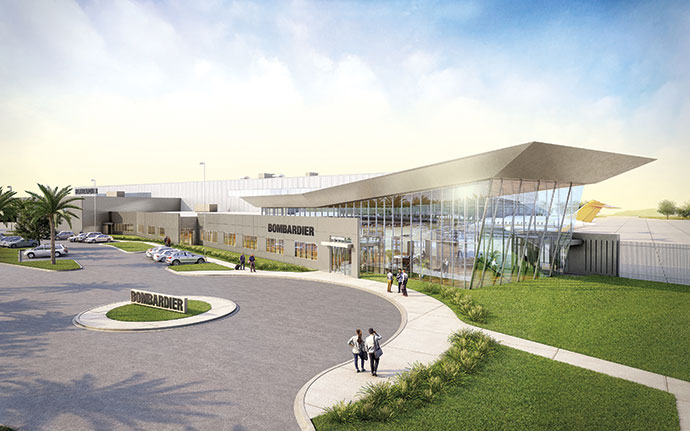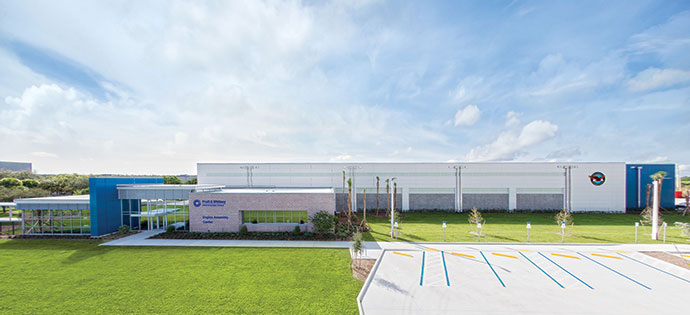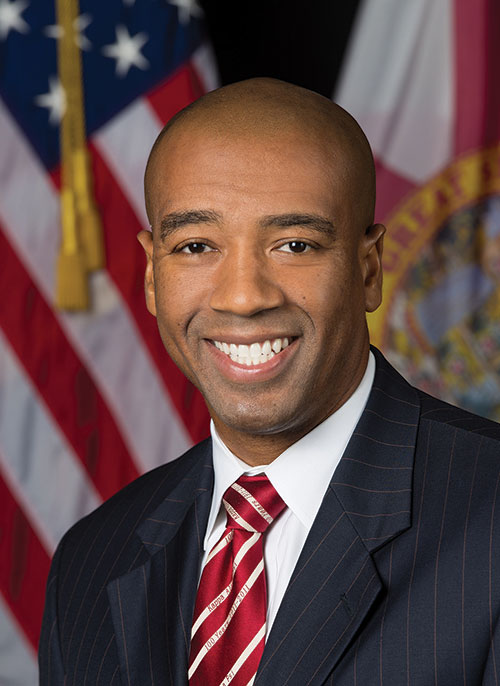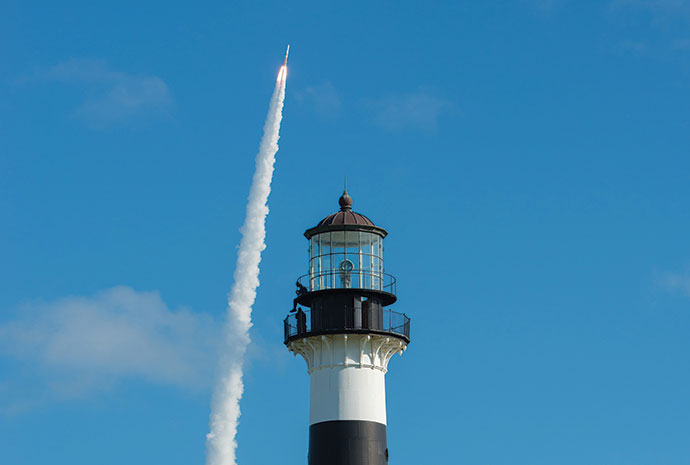You never forget your first rocket launch.
“Early in the space program, I was at KPMG doing work for a space company and I was brought to Florida for a launch,” says Frank DiBello, who since 2009 has served as the president and CEO of Space Florida and the state’s Space Authority, which among other duties is in charge of Florida’s six spaceports.
“It had a profound effect on me,” DiBello says of that launch. “It wasn’t the rumble of the rocket, but the awe that we were reaching beyond to a new era of exploration. That’s what prompted me to start the space practice at KPMG, and to go into the venture capital business.” DiBello this year was appointed to the U.S. Department of Commerce’s Investment Advisory Council. “As the $414 billion global space market continues to expand, with some projections showing the international space economy will reach into the trillions of dollars by 2040, the State of Florida is poised to support continued U.S. leadership in space,” said a release.
“Over the years I’ve seen more than 100 launches,” says Jeff Troan, the Orlando-based director of the credits and incentives practice at tax services consultancy Ryan, and an aerospace veteran. “The best and the first would be the Apollo 11 launch in 1969. There were no solid rocket motors in those days, and the Saturn was a very heavy rocket. The flame trail would extend hundreds of feet while it wavered on the pad for seven to 10 seconds before finally crawling into the air.”
It was a different time also, he says.
“In those days we believed that science and technology was man’s best new hope, and we could engineer our way through our problems,” he says. “Of course, we had a surplus of young engineers in that generation … and that’s probably how we got to the moon in less than a decade.”
That legendary era is orbiting back for a return engagement as the commercialization of space unfolds. The view shows Florida’s talent shining as bright as its infrastructure.
Florida Secretary of Commerce Jamal A. Sowell, who also serves as president & CEO of Enterprise Florida, recently retraced his family’s many trips to the coast for launches when he attended celebrations marking the 50th anniversary of the Apollo 11 mission. “As we talk with other companies, Frank DiBello’s great work is now being highlighted on a national level,” he says, noting that aerospace expertise extends to every corner of the state. “Florida has a brand that others just can’t replicate.”
Workplace of Choice
Building on a schedule that has included visits to Morocco, Vietnam, Ghana and Israel, Secretary Sowell led a delegation to the 2019 Paris Air Show involving some 25 companies that resulted in around $2 million in sales during the event and $40 million in total projected sales, as well as some simmering company expansions. He says talent and workforce are priority No. 1 for the company leaders he met.
“Not only do we have a top university system, but we have the talent,” he says. Florida Gov. Ron DeSantis recently helped launch an apprenticeship program for the aerospace industry, and there is about $2 million in funding available through Pathway to Career Opportunities grants. The state’s university system, he says, “is not only delivering high-demand workforce, but valuable research, fueling the innovation economy. And this year the legislature founded the Florida Talent Development Council, “which puts education leaders, workforce stakeholders and business leaders around the table to focus squarely on developing workforce pools for the future.”


Ryan’s Jeff Troan salutes the University of Central Florida in Orlando in particular.
“UCF is a state school with a very low tuition and an excellent engineering program,” he says. “It allows a young middle-class engineering student to graduate from college with no debt and earn more than $100,000 a year in the aerospace industry out of the gate.”
“UCF has formed several partnerships with companies like Lockheed Martin and Raytheon,” says Enterprise Florida’s Katie Hogan, manager, Aviation/Aerospace and Defense. Lockheed Martin employs thousands in the Orlando area. “UCF has for four years now been the number one supplier of students going into the aviation/aerospace industry nationwide,” she says.
DiBello sees the talent equation being worked out much earlier.
“I’m pleased with what I see Florida doing to initiate an earlier dialogue with kids in middle school and grade school about career choices, and the value of STEM and STEAM skills,” he says. In addition, Florida has a strong community college system that encourages career paths that don’t require a four-year degree but do require intense training.
The 28-member Florida College System combined with the 12-member state university system to earn the state a No. 1 ranking in the 2019 U.S. News & World Report Higher Education rankings. “When a company comes here, they’re not just going to learn how we can find more engineers for them,” says DiBello of the kindergarten-to-career approach, “but see the whole ecosystem of supply. It is critical to what we’re doing.”
Variety Show
Nearly 100,000 Floridians work in Florida’s aviation and aerospace industries, which encompass such thriving sectors as maintenance, repair and overhaul (MRO), flight training and simulation, and unmanned aerial systems (UAS).

“I want Florida to become the leading global enabler of commercial space, the way London opened up maritime traffic in centuries past.”
Recent projects show the sector’s diversification. JetBlue in August named Fort Lauderdale as the new home for its JetBlue Travel Products subsidiary. In Lake Wales, just south of Winter Haven, ALSIM, a French manufacturer of flight simulators, is opening a new North American assembly and support facility that will create up to 40 new jobs. Another satellite venture, Aevum, is investing at the Cecil Field Spaceport in Jacksonville. Boeing announced in June it would relocate the headquarters of its Space and Launch division to Titusville from Arlington, Virginia.
OneWeb Satellites — a joint venture of OneWeb and Airbus — in July opened the world’s first high-volume, high-speed advanced satellite production facility at Exploration Park on Florida’s Space Coast. The facility will create 250 new high-tech jobs and 3,000 indirect jobs as it supports the growth of the OneWeb network, starting with a constellation of 650 satellites and scaling to 1,980.
Firefly Aerospace will invest $52 million and bring more than 200 jobs to Cape Canaveral Spaceport. Space Florida will help by matching the company’s infrastructure investments up to $18.9 million via the Florida DOT’s Spaceport Improvement Program.
Frank DiBello says launches will keep pace. Cape Canaveral Spaceport remains the most active orbital launch site in the world and hosted 20 successful launches in 2018. “We’re building the capability to launch up to 100 launches a year,” he says.
A State That’s Earned Its Stripes
Florida also is home to 60,000+ active duty personnel, 30,000+ civilian personnel, 11,000+ annual military separatees, and 1.45 million veterans.
“The military component is so important,” says Secretary Sowell. “Enterprise Florida houses the Florida Defense Alliance and Task Force, and we work daily to execute our vision to help bases and service members.”
Sowell, a veteran himself, says aerospace is a sector “that understands veterans and their experiences. Every major defense contractor has a presence in Florida, and many from overseas do too. We have about $15 billion in deals and contracts annually. Not to mention there are about 20 military installations in the state.”
But one more wouldn’t hurt: Gov. DeSantis has directly pitched the White House on the idea of bringing the U.S. Space Command, established by President Donald Trump in early 2019 as a new division of the U.S. Air Force, to Florida, where he feels it rightfully belongs.
“As the world’s premier gateway to space, Florida has been the departure point for more cargo and humans to space than any other place in the world, so I believe our state is the logical choice to base this new command,” Gov. DeSantis wrote in a letter to the president.
Turbo-Charged MRO
“As a very young child in the late ’60s I remember seeing on TV the first moon walk,” says Mary Anne Cannon, vice president, West Palm Beach Site and Development Operations at Pratt & Whitney. “It was very memorable … It made me realize that there no longer were any limits.”
Pratt & Whitney’s site has surpassed limits ever since its establishment 60 years ago. The company in June announced an investment of up to $45 million to meet growing MRO capacity needs. In 2018, the company announced an investment of up to $100 million that will create up to 215 new jobs by 2022.

“Florida has a brand that others just can’t replicate.”
“Our programs rely on more than 100 suppliers throughout the southeast United States, with more than 20 suppliers based in Florida, so it’s a key location for us,” Cannon says. “We also rely on the availability of a skilled workforce.” That means partnering with higher education to maintain and boost skills. “We have contributed more than $10 million over the last five years to support these educational programs. In West Palm Beach, we partner with Palm Beach State College’s Electrical Power Technology Program.”
Other support programs for the region’s thriving aviation and aerospace sector include the Boynton Aerospace Science Academy (BASA) at the high school level; Palm Beach State College’s Engineering Technology Program; and four-year degree programs at Florida Atlantic University and the University of Florida.
“When we established the West Palm Beach facility in 1958, the space race was happening,” Cannon says. “In fact, the West Palm Beach facility is a recognized historic landmark because it’s where the world’s first liquid hydrogen fueled rocket engine was created in 1958. That innovative spirit has continued to fuel our growth and our access to talented people … As we continue to evolve, grow, and expand more into aftermarket and MRO, this facility will grow.”
Incentives and credits consultant Jeff Troan says while space and UAS get a lot of buzz, he sees great value and job creation potential in pursuing such unglamorous but powerful sectors as MROs, cybersecurity and equipment and systems refurbishment for the military.
That said, UAS may be unmanned, but it’s not unwanted: Five years ago, the FAA began awarding grants of exemption to companies looking to use UAS. According to the Association for Unmanned Vehicle Systems International, Florida, with 571 exemptions as of the last tally, was second only to California, and more than 100 ahead of Texas.
Space Florida Brings Unique Value
Troan says one of the most unique programs to come out of previous state administrations was Space Florida, “which provided financing and alternative ownership that pulled a large volume of new aerospace work into the state.” Indeed, says Frank DiBello, rocket science makes headlines, but financing makes deals.
“We finance everything from launch pads to road and bridge improvements,” says DiBello, who is also drumming up interest in a $1 billion infrastructure fund. “We finance R&D, manufacturing facilities, and lots of areas of tooling and equipment.” In the manufacturing arena, he says, “We build in mechanisms that allow us to replenish and update on a three- to five-year basis. That keeps up with the fact industry is developing and adapting technologies at a rate much faster than government ever could.”
He sees the drive to be in space as an essential quality for innovation and for civilization.
“When you push to do things in space, you’re pushing the edge of technology. Doing that pushes every aspect of society, and raises the level of the people,” he says, noting that 19 billionaires now are putting money into space activity. Their visions and Florida’s jibe with the newly reconstituted U.S. Space Council’s directives: to return to the moon, and to manage low-orbit traffic to connect activity “up there” with all the bandwidth-hungry AI, IoT and other innovation down here.
“As we increase satellite, human and robotic activity, we’ll be sending 10,000 satellites into orbit over the next 10 years,” DiBello says. “As we’re moving to 5G in this country, there are still over a billion people in the world who are unconnected. We’re looking at some 26 different constellations going up in the next decade, some made up of thousands of satellites, with the idea being to provide global connectivity to every nation of the world.”
Lofty goals? Maybe. But Florida is positioned to place those dreams into orbit.
This Investment Profile was produced under the auspices of Enterprise Florida, Inc. (EFI), a partnership between Florida’s businesses and government that is the principal economic development organization for the state. For more, visit enterpriseflorida.com.

